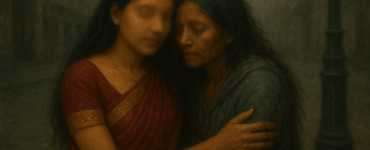Telugu: Ramachandra Rao
***
The Boy entered the spacious drawing room and stood obediently in one corner. Pate Rao, who had just finished his morning tea and sank into the downy sofa listening to the BBC looked at him. “What do you want?” the looks seemed to question. As per the English custom at Oxford, his friends used to address Pratapa Rao as Pate. After his return to India, his name had changed to Pate Rao.
“Master, bath is ready,” informed the Boy.
Pate Rao got up to enter the bath attached to his bedroom. A dinner jacket, freshly ironed, was lying on the bed. In front of the sofa next to the dressing table, polished shoes and a pair of black socks were also in readiness. A shirt matching his dress suit was hanging to an arm of the sofa. Golden cuff links were attached to it at hand. And on the table a black ‘Bow Tie’ was ready.
“Boy!” Pate Rao almost roared in anger.
Alarmed, the Boy came back running.
“Why did you ready the white shark-skin coat?”
For a moment, the Boy hesitated to reply. Then he ventured, saying, “Master! Last time you wore a black D.J.” he reminded.
“Does not matter. I will wear it this time, too.”
‘Oh, it wasn’t his fault,’ Rao rued within. It was he who instructed the Boy to prepare the black and white DJs alternatively for the parties. But this party was special, and he forgot to inform him beforehand. Then again, he felt there was nothing wrong in venting his anger on these boys. Otherwise, it will be difficult to put them in their place… he reasoned.
It is hard to describe the relation between the Boy and Pate Rao. Pate Rao had a great liking for the Boy. He was a Telugu native, Lova Raju by name. He served British lords and nobles for long and earned the position of a Boy. A British noble person, Mr. Hunter, while returning to England after his retirement, recommended this Boy to Pate Rao.
“He is very handy and useful. He understands instructions given in English and could even speak few sentences in English occasionally. But Pate, let me caution you, keep an eye on your whisky,” Mr. Hunter said with a guffaw.
When he came to know that the Boy could speak a little English, had taste for whisky, and earned the approbation of Britishers, Pate Rao did not think twice to take him under his service. And, matching the love and affection showered on him by Pate Rao, the Boy acquitted himself commendably in his duties living up to his expectations. From the moment his Master got out of Madam’s bedroom in the morning, the Boy took care of every need of Pate Rao till he left for office. From removing the night gown, helping in changing to new clothing, applying oil to his hair, readying water for bath, helping in slipping into office dress, he attended on him to every other detail without a reminder; he would inform the cook about his master’s breakfast choice in advance and instruct the driver at what time he should keep the car ready. There were fleeting moments when Pate Rao was worried that he might not be able to manage his affairs without the Boy nearby. But he never allowed that thought to trouble him for long. How could he miss him? He was paying the Boy more than his due. Even on the few occasions he lost his temper, it was too brief, and he never carried it beyond the moment. If he was not harsh, he thought, the Boy might take undue liberties with him.
The Boy, for his part, served his master with utmost respect and diligence. He often remarked to his friends that he felt he was still serving under the British; and that his master imbibed the habits of the British lords and was never stingy with money. ‘What if he vented his anger occasionally,’ he argued, ‘a master is not a master if he never vents his anger?’ A bearer under Lord McKenzie told the Boy once: ‘Why? A master without anger seldom bears any dignity and generosity.’ Lord McKenzie was a gentleman to the core and never used offensive words against his servants. He was meticulous in his accounts and the workers never got any easy money nor tips. That was the reason for his grouse. “How I wish my master also boozed and abused us like rest of the nobleman, but in the end left us some tips and heady liquors!” He grieved before the Boy.
“But for me, all others who attend the parry today are Whites.”
Pate Rao tried to explain the reason for preferring the black DJ tonight. At such moments, Rao felt that the Boy was an intimate person. He was even tempted to call him by his name. But years of acculturation – the culture of the British who worked in India – prevented him from doing that. In those moments, the word Boy sounded more mellow and amiable.
“People, of late, started wearing a white coat over black pants to attend dances and evening parties, but a fastidious Britisher will not count it for a DJ,” he said.
The Boy was listening to his master with all attention and dismay. That was new to him. He could share that knowledge with his friends tomorrow.
“I ordered for the white DJ as it is permissible in the Indian circles. And, also, helpful in the sultry Indian weather,” he continued defending his mistake.
The Boy hung the sharkskin coat back to the hanger in the wardrobe and pulled out the black DJ made of Vicuna fiber. Attending a party putting it on in sweltering summer weather amounted to preparing for sufferance for long. Settling mentally for the ordeal, Pate Rao entered the bath.
Warm water was three-fourths full in the tub. He dipped his fingers into the water to check the temperature, and after being satisfied, entered the tub. But for the rippling caused by his feet as he entered the water, everything else was silent and peaceful around. The bathroom built with exquisite green marble reflected magnificently over the spotless white surface of water. He pulled out a cigarette from the soap and sponge stand at one end of the tub and lit it. Warmth filled him from within and without. His thoughts lingered over the cocktail party he was going to attend.
Mr. and Mrs. Stuart were throwing a party for the winners of Rugger Football between seven and eleven that evening at the Bridge room of the club. He was the lone Indian among the invites. There was no Indian player among the Rugger Football team. That caused a heartburn for the Indian Club members. They complained that all the whites connived at to drop Indian players. “Useless gossip,” dismissed Pate Rao. Preoccupied with his business matters of late, he did not pay attention to Rugger, and he could not make an honest assessment of the situation… he thought. But fifteen years back, he was part of the Rugger team when none of the Indian club-members had any merit in playing Rugby. White men always tried to be friendly with the Indians then, and now. When you did not have any merit to play, of what use is dubbing the selection committee was all whites?
“We just envy them,” he concluded.
We cannot match them. No matter how closely we imitate them, we don’t share any common interests. In the good olden days, when the British were at the helm, there was a remote chance of an Indian being closely friendly with the British at the booze. After the implementation of prohibition, even that chance was nullified. And to be honest, there was no merit in the accusation that the British were sidelining us. A Britisher would die for an Indian who had a good standing in the society. The problem comes with those people sans civility who aspire for more than what they deserve. It is unfair to expect a Britisher to be friendly with every club member, occupying a prominent position by chance.
Cigarette burnt Rao’s lips as fire reached its butt end. Throwing the remains into the ashtray fixed to the wall, he looked at the timepiece ticking in the cupboard. Good lord! It was nearing seven o’clock!
He quickly flushed out the water. Taking a perfunctory bath under the overhead shower he came out.
Looking at his reflection with Dinner Jacket in the mirror, Pate Rao was immensely pleased. The front of the coat was dazzling bright. The shirt collar and the bow perfectly matched the DJ. And under the brilliance of electric lights, the shews glittered brightly. The only thing missing was a carnation flower decorating the buttonhole of the collar. Carnation flowers won’t grow in the hot humid weather of the place. What could he do? As an alternative, he selected a red rose. Looking at himself for the last time, and his smile reflecting his satisfaction, he walked out into the portico. Driver in Uniform was ready standing aside, opening the door of his Jaguar. Pate Rao gracefully entered the car and said, “let’s go!” The driver closed the door behind him and started the car. The splendid, black, Jaguar Mark VII silently slipped into the darkness.
*
The Bridge room was brimming with people by the time Rao reached there. There were many Dinner Jackets. But, contrary to Pate Rao’s expectation, not all of them wore matching suits. He could see a white Dinner Jacket over black pants here and there. He also found people turning up in lounge suits, and even ordinary coats and pants. Pate Rao was a bit surprised. Mr. Stuart invited him with all customary dignity and took him to the bar arranged exclusively for the party.
“What’s your choice, Pate?” asked Mr. Stuart.
“Whisky and soda,” replied Pate Rao.
Mr. Stuart mixed soda with Whisky in a glass and served Pate Rao personally. They clanked their glasses in “cheers” and started sipping the drinks.
“Pate, you must meet McFerson’s. Both are Oxford products.
Stuart took Pate Rao into a group of eight and introduced Pate Rao. The introductions took a break from the conversation they were busily engaged in. And soon they resumed their conversation. Pate Rao could not make out what they were talking about. He kept company for the sake of courtesy but was constantly on the lookout for a familiar face in the room. There were at least half a dozen groups of people with four to six people in each group. All of them were white people. That he was the only Black person among them gave Pate Rao immense satisfaction. There were at least two or three people in each group, and with smiles and nodding of heads acknowledged his presence. He refrained from joining the groups fearing it would be impolite if they were discussing personal matters.
Pate Rao’s glass was empty. Mr. Stuart descended from nowhere and said, “Pate, give me your glass. I will refill it.”
Pate Rao smiled thankfully.
“Would you prefer whisky again or want to taste cocktail?” asked Mr. Stuart.
“Whisky, please.”
Handing him over his whisky glass, Mr. Stuart disappeared into the gathering once again. There was a note on the wall which caught Rao’s attention. It read: “Admission strictly restricted to people holding the permit.”
He grinned involuntarily. He knew people without a permit would drink in that room every day! For that matter, he did not have a permit himself. But who would care to object? Every one of the British club members here had tasted liquor one time or other in the parties he threw. He had enough influence in the government circles. That he did not have any permit was a secret known only to a select few. And among those few, it became a joke whenever the subject cropped up: “Don’t insist Pate to show his permit. He would see to it that prohibition is lifted.” But for his family doctor’s resistance, getting a permit was not a challenge for him. “You are a heart patient. If you start taking more liquor, you are sure to die within the next two years,” his doctor warned him once. “That’s great! I can live happily for two years at least. Of what use is living dry for hundred years?” he said in return. “Nothing doing. Not only that I shall not give you permission, but I shall also see that no other doctor gives you either,” avowed his family doctor. His heart filled with gratitude for his love and concern for him. For that matter, he was not fond of boozing. He would taste whisky or beer occasionally, and that too for the sake of company. It was why he did not kick up a fuss about it with his doctor. And if he were a real boozer and had a permit, how long would that four- units-permit last? Not even for a single party. He needed no permit.
Suddenly it dawned upon him that he was all alone and lost himself in thoughts. He remembered his wife, Rita. What might she be doing in Delhi with her sister Susee? Perhaps, she would be defending the whites. Rita and Susee spent two years in England with their father. They were born and brought up in the same society till they got married. But their mind sets were so different! Rita loved English culture. Suseela was just the opposite. How dearly he wished Rita had been here beside him now. British community here held ample respect for Rita. She was helpful to everybody. Had she been here at the party today, the whole community might have flocked around them … thanking her for the pickles she had sent or asking her for Indian breakfast items, or seeking her guidance regarding embroidery designs, or seeking appointment to play tennis with her in the evening at our home, and what not. Rita was equally eager to show her ability in all these matters. “She is crazy,” Suseela would say. “You are helping them so much. But did you get a single thing in return from the community?” Susee would ask Rita. “Why not? But one shouldn’t make comparisons. Because, our dishes and our crafts are new to them, and they have fascination for them. Whatever they have, they have it from here; and it is our own things they buy. So, what is it novel they could offer that we did not have? Besides, theirs was hard-earned money. What for they come here travelling thousands of miles from home and working in a place like ours? To earn money. Their coming here to work is not to waste away the money they have earned. If the whites coming here for work live prudently only to save some money and get back home to live peacefully there, what was wrong with that?” Rita would reply.
For standing aloof and alone from the groups, Pate Rao realized, that his thoughts lingered on every subject. He noticed the young brigade, mostly Rugger team members, making a hell of a noise in one corner. They should have been flocking around Rita had she been here. “Why do you keep laughing blissfully silent when all those naughty boys vie among themselves for a chance to dance with you, as if it were their birthright?” Susi asked Rita once when she visited the club. Often, her question that night raised disturbing thoughts in his mind. True! These unmarried English youth go bonkers over women who move friendly with them. Afterall, they are starved of a feminine face for a simple conversation here. There is no surprise if they behave the way they did when they come across a beautiful, witty, English-speaking woman like Rita? Of course, Rita was very pragmatic and could put everyone in his place. Suddenly, he got a gut feeling that if all his standing in the British community was not on account of her! And soon he tried to dismiss it. He wanted to return home. But there was no sign of anybody stopping for the day. Dejectedly, he moved to a corner and started gently sipping his whisky.
*
The hullabaloo in the room was on the rise with every passing minute. The conversations that were going at a low key till a while ago took a wild turn. Friendly banter and teasing laughter turned to arguments and yelling. Whisky, Beer, Rum, Sherry and other wines and liquors at the bar started evaporating fast. Youth was in high spirits… singing, dancing, breaking glasses, picking up quarrels indiscriminately, and losing their sense of propriety and decorum. Some of the elders attending the party did not relish it. But unfortunately, they couldn’t help it either. The number of Britishers living at that place could hardly be counted by a hand. If the youth were to be discounted, few would be left out. Accepting the youth, and their actions, at the parties was an ineluctable choice. Those who could not put up with it, like those attending the party with their spouses, found convenient excuses to leave early. And the remaining seniors settled in one corner of the Bridge room and lost themselves in gossip.
At the other end, feigning a cheerful disposition, the British youth were encouraging one another for the adventures. someone wagered on who could take the largest amount of liquor in a single gulp. Challenging people to take a cocktail and sitting the winners on their shoulders, they were making merry singing wild lays. They threw a different kind of challenge at Duncan Harvey, the top-notch performer in the Rugger game that evening. “You scored from several free kicks this evening. Can you break this whisky bottle in a single kick?” they challenged.
“Oh, yes,” he accepted the gauntlet trying to shake off his drowsiness.
“That’s the stuff, Duncan,” they encouraged him.
They all clapped in unison. And lo, he blasted the bottle against the wall to splinters in a single kick with his shoe. The elders sitting at the far end could not make out the reason for such a blasting sound. And the band was back to their drinking spree.
Suddenly, one of the youth felt that the noise was too much.
“We are not behaving in a civilized way,” he shouted.
“Shut up!” a group of people shouted back.
The youth refused to cow down. He leaped onto the table nearby and announced, “Ladies and gentlemen, …”
“There are no ladies here,” somebody raised an objection.
“We want ladies here. Ladies here,” they raised slogans in a chorus.
After keeping silent for a minute, the youth began once again, “We are behaving in a very unbecoming way,”
“Boo… boo…” People booed at him. But he did not budge.
“We should stop this nuisance forthwith and start behaving like the true British youth, who occupied an important position in the civilized world.”
“Not an important position but the premier position,” somebody corrected him.
“Okay. I agree. The top spot. But what I expect from you is that you occupy the chairs around the table without making noise.”
“There are neither benches nor chairs here,”
The youth could not hold his laughter. Others joined him.
“Who said they are not here? This is Savoy hotel. A top ranked hotel in the world.”
“Okay,” said all of them.
“Sit around the table like this,” the youth jumped down the table, pulled out an imaginary chair, and pretended to sit into it. Others followed him sitting in the air.
“Fine, fine,” admired everyone.
“I am a bearer here. Let me warn you. Mine is no mean position in Savoy. It’s hard to get a seat at the table in Savoy. If you don’t conduct yourself well, I may be compelled to send you out,” declared the youth.
“Agreed.”
“Red-carpeted lounge, laid with premium brand leather chairs, gentle light descending from the ceiling lights, and a lilting delicate heart-warming music in the background floating in the air …”
“What about buxom girls jiggling around flaunting their b…s?” shouted someone.
“What nonsense you are talking about? Have you ever visited Savoy before? Do you suppose this hotel to be another cheap nightclub? Nothing of that sort is allowed here.”
“I don’t care. I want a blond, thin-waisted, shapely girl dancing for me now,” he shouted back.
They all burst into unrestrained laughter. One of them got up and volunteered to dance. “I don’t have any b…bs. Is it okay if I substitute these bottles in their place?” he said, casting out his overcoat. All of them hailed wildly in pleasure.
“This is not good. We want burlesque,” proposed another.
“Yah,” they all seconded collectively.
Suddenly, all the British youth who left their shores long ago to make a living here felt homesick. An inexpressible angst seized and weighed them down. Their thoughts first turned to their homeland… London, Hyde Park, Big Ben, No.10, Downing Street, Night Clubs, Burlesques, Pubs, Cinemas, young girls… beautiful young girls they dated and who followed them without reserve to cinema houses, theatres, parks and every place and any place after office hours and weekends. Then they turned to their homes, parents, and siblings. Those fond memories filled their hearts with sweet pangs. In their ruckus lay their love for homeland, their helplessness behind that feigned excitement, and strains of grief behind their laughter.
“We think about that later. Take your seats first. Let me fill your glasses with champagne,” proposed the first youth.
“Then, let me help you,” Duncan Harvey also got up.
They pulled out their handkerchiefs, wrapped them around the imaginary bottles over the table, and started serving the fictitious champagne in small quantities to each youth sitting in the airy chair. Suddenly, Duncan Harvey’s attention fell on Pate Rao.
“How come this black hide is here?” he almost shouted. All eyes turned to Pate Rao. His mind suddenly went blank. Duncan Harvey drew near Rao with his fictitious bottle. His eyes teemed with hatred.
“Who are you? How did you get in?” He accosted Rao.
“Duncan,” Pate Rao looked flustered and searched for words nervously as he realized they were all drunk, and the situation was getting out of hand. In no time more youth surrounded Pate Rao.
“Get out of here. There is no admission for Black people in this hotel,” said Duncan raising his voice.
“Duncan, you know pretty well that there is no such restriction in Savoy!” Rao tried to smile away.
“I know nothing about Savoy. I did not visit it even once. But I will not allow you to stay a moment longer here. Get out!” said Harvey.
Pate Rao was aware that none of them had even the remotest chance of having ever stepped into Savoy. But he attended any number of parties there. Suddenly, a wave of pride coursed through his body.
“I came here on invitation,” he said.
“Where is your invitation?”
He did not bring it. “You can check with the Stuart’s,” he said.
“We don’t check with anybody. Do you have the permit to drink?” A remote voice questioned him.
Pate Rao was in a fix. Someone was still in his senses despite the alcohol. He knew but for their intoxication, they would not have behaved that way. He did not get angry.
“I need no permit,” he said.
“Don’t brag,” Duncan Harvey cut him short. He caught hold of Rao’s arm and started dragging him out. Rao tried to wriggle out of his violent grip. A few more hands joined Duncan and they collectively pushed Rao out of the room and bolted the door.
When the matter came to Stuart’s notice, he got furious.
“The British youth behaved like brutes,” he said. “What authority has Duncan to insult my guest?” he roared in anger.
“All of you go and apologize to Pate,” he insisted.
Duncan Harvey came forward.
“We are not going to apologize anybody,” he said, “we don’t need to apologize a black hide.”
“What if he is black? He is far better than all of you. Have you any idea about his status in the society?” Stuart shivered with anger.
“The kind of luxuries Pate Rao enjoyed were not available in your country and they are beyond your wildest imagination. He had friendships in this country with such people whom you can’t even remotely get close to. He studied at Oxford. Did you ever hear the name oxford?”
Stuart laughed derisively.
Duncan Harvey grew more adamant.
“I care a hoot about it. How did you invite a person who had no permit to drink?” he confronted.
Mr. Stuart was shocked that Harvey, who boozed freely at Rao’s expense at his home, was talking like that. Other youth supported Harvey’s stand. Mrs. Stuart smartly assessed the situation.
“John is tired. Please don’t bother him further. Let him take rest,” she pleaded with them. She walked her husband out.
“We whites are only a handful. Strangely, we fight amongst ourselves,” someone remarked from behind.
“I admit that it was a mistake on our part. But then, how could he stand up for a black hide against us whites?” A sizable number of them expressed their resentment.
“Well, we may fight amongst ourselves for any reason. But shouldn’t we stay together when it comes to fighting against a black?” said another few.
Mrs. Stuart took her husband to a corner in the lounge and tried to reason him out.
“You better forget this matter here,” she said.
“Pate is our guest, Mary?” There was deep hurt in his voice.
“I can understand your pain. But there is nothing we can do now.”
“Why can’t we do?” He got up angrily.
“I can’t rest in peace till these beasts apologize Mr. Pate.”
“That can never happen, John,” she said.
“Why?”
“Do you know how agitated Duncan is?”
“I will teach him a lesson.”
“John, forget about your ideals. Who is more important to you, Duncan, or Pate? I admit that Pate is a good friend of yours. But in the present circumstances…”
Mr. Stuart did not answer. So, she continued…
“What Duncan did in his inebriety was wrong. But why do you make a fuss about it? You know the kind of reputation he and his rugger commands in the British community. An enmity with Duncan amounts to enmity with the British community here.”
“Rugger, Duncan, Rugger! Is there nothing worthier to aspire in life?” Stuart shouted at her.
“John, one more thing. At least for the sake of Pamela, you must stop being cranky.”
Mr. Stuart understood. Pamela was their daughter. She lost her heart to Duncan. But Duncan was hardly twenty-five. He was in a key position in a reputable company. He was attractive. As a rugger (rugby player) he commanded respect in the British community. There was no groom more suitable for their daughter than Duncan Harvey.
Mr. Stuart fell silent. He silently looked at the whisky in his hand. He drank it in one gulp and dried his lips with a handkerchief.
A smile flashed over her lips as a mark of her triumph. Getting up from the sofa, she reached for him, patted him on his shoulder, and planted a gentle kiss on his cheeks with love and empathy. Then she went into the bridge room.
Addressing all the youth there she said: “John is having a mild headache. He asked me to convey his apologies for his inability to join you here. He requested you all to make merry for the rest of the evening with the drinks.”
The message was clear to them. Their faces lit up.
“To the health of Mr. and Mrs. Stuart!”
They roared in unison, filling their glasses to the brim.
Someone started singing…
“He is a jolly good fellow… fe…llow… he is a jolly good fe…e… e… lo.”
All of them caught the refrain.
Their song reached the ears of Pate Rao who was searching for his car in the foreyard. It was very unsettling. At the parties thrown by him in his house, these very voices sang this very song for him. He walked around briskly. The black Jaguar was in its place, but in the pitch darkness he could not notice it. He brushed against it hard and hurt his hand. Cursing the darkness, the black car, and the driver blissfully asleep in his seat, he got into the car and pressed the horn violently.
The driver woke up with a start, put on his cap crumpled in his seat hurriedly, and revved up the engine.
***
(Original: Nalla Tolu)
First Published: Andhra Patrika Weekly, 12-8-1959









Add comment